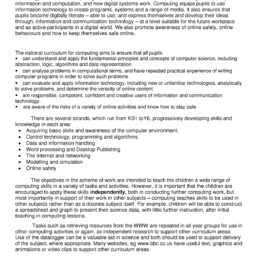 |
Computing-Scheme-of-Work-23-24.pdf
Computing Scheme of Work 23-24.pdf application/pdfComputing Scheme of Work 23-24.pdf Open Download Copy Link 196.79 KB 2023-10-04 4 October 2023 2023-10-04 4 October 2023 |
1
As part of the Tibshelf schools federation, we work closely with infants to build upon skills and progression from our KS1 feeder schools. Town End Junior School is committed to developing the use of Computing throughout the School organisation and to developing the skills and knowledge of staff and pupils.
Computing is developed as a set of adaptable and cumulative skills rather than a discrete subject, which they use in support of their learning in other subjects – the computing scheme of work reflects the key elements of the National Curriculum: using software and to program algorithms and ‘make things happen’, explaining how computers and the world wide web work, using computers as a tool to present work using IT and multimedia, E safety – We ensure that young people know how to act responsibly when using technology, that they are aware of the dangers of the virtual world and that they know how to stay safe and who to turn to for help – every year, the school takes part in ‘Safer Internet Day’ and conducts e-safety lessons and assemblies regularly throughout the year.
We maintain a ratio of 1 laptop to 2 pupils in all classes, which promotes collaborative working and discussion in enquiry and problem-solving. This also means there is excellent access to a wide variety of software and computing opportunities – pupils are taught to be independent, confident users of technology and to use it for enquiry and to evidence learning.
Intent
Computing has an important role in supporting, enhancing and extending the learning process of all children at all levels across the curriculum. Through the use of Computing across the curriculum, we will be able to help children by:
- developing their confidence and satisfaction in the use of Computing in a wide variety of formats.
- broadening their understanding of the effects and applications of Computing in the wider world.
- appreciation of the need to adapt to changing methods of working with Computing
- enabling them to independently use a wide variety of equipment at an appropriate level.
- encouraging development of investigation and prediction in problem solving.
- enabling them to take a greater responsibility for their own learning.
- further developing and enhancing research skills.
- developing decision making skills & selecting appropriate usage of Computing in their own work.
- understanding the value of Computing and that it should have a purposeful end product.
- developing independence and creativity in their Computing projects.
- understanding algorithms and how they affect the planning of programming & systems in real life
- developing an awareness of online risks, and how to stay safe
Implementation
- The national curriculum for computing aims to ensure that all pupils:
- can understand and apply the fundamental principles and concepts of computer science, including abstraction, logic, algorithms and data representation
- can analyse problems in computational terms, and have repeated practical experience of writing computer programs in order to solve such problems
- can evaluate and apply information technology, including new or unfamiliar technologies, analytically to solve problems, and determine the veracity of online content
- are responsible, competent, confident and creative users of information and communication technology.
- are aware of the risks of a variety of online activities and know how to stay safe
There are several strands, which run from KS1 toY6, progressively developing skills and knowledge in each area:
- Acquiring basic skills and awareness of the computer environment.
- Control technology, programming and algorithms
- Data and information handling
- Word processing and Desktop Publishing
- The Internet and networking
- Modelling and simulation
- Editing and manipulation of sound, images and media
- Online safety
The objectives in the scheme of work, and computing lessons, are intended to teach the children a wide range of computing skills in a variety of tasks and activities. However, it is important that the children are encouraged to apply these skills independently, both in conducting further computing work, but most importantly in support of their work in other subjects – computing teaches skills to be used in other subjects rather than as a discrete subject itself. For example, children will be able to construct a spreadsheet and graph to present their science data, with little further instruction, or produce a Powerpoint presentation to present enquiry findings, after initial teaching in computing lessons. Depending on timetabling, lessons will be conducted weekly, or in termly blocks, following the scheme of work across the school year.
Impact
Children will gain skills progressively through each year, building upon previous skills. They will be confident in their use of computing, both in lessons and in support of other subjects, recognising the most appropriate skills to use. In discussion, they will ask useful questions and present possible solutions when problem solving, which they will test out. They will be able to discuss both their method whilst working, and their outcomes. Children will be able to explain their understanding of potential risks when using the internet and how to stay safe. Teachers’ planning, teaching and AFL addresses the engagement and accessibility of PP groups and SEND pupils, so that they are able to access the curriculum effectively at their level of attainment.